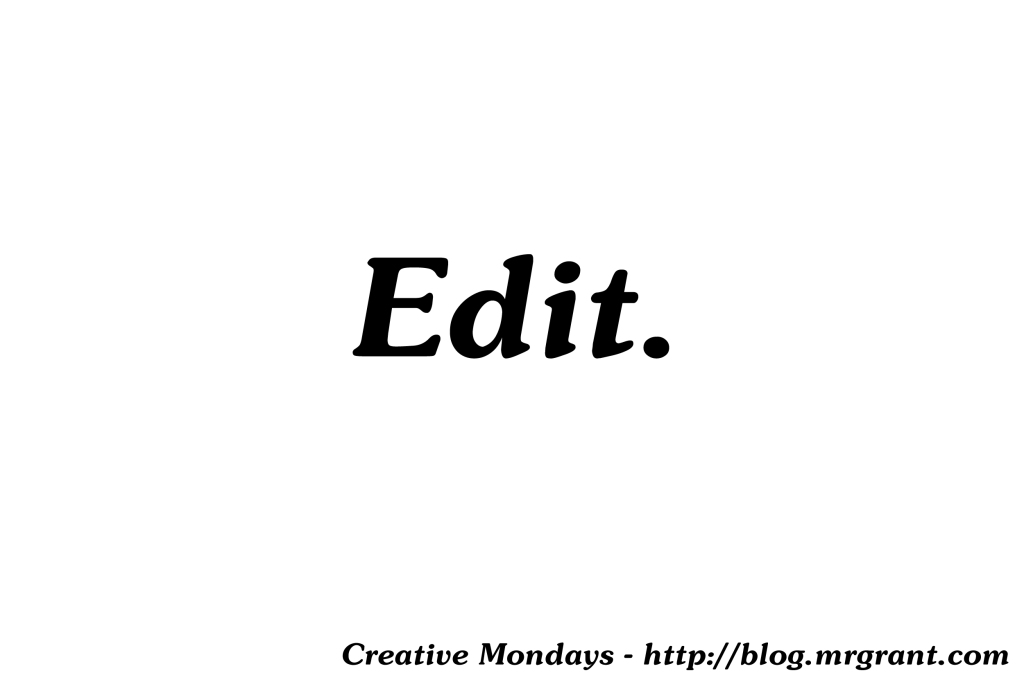Creative Mondays #048 – Edit.

Today, we tackle a topic I have HUGE problems with. Editing. Mainly, editing your creative work. Now this might have more of an importance for those artists who are writers, but there might be a thing or two that can be taken away from this by those who work in other fields as well.
I hate editing. I really do. And, if you’ve been a reader of this blog for any amount of time longer than a week, you know I’m telling the truth. My immediate reaction to writing something is, “Done.” I feel I’ve come up with all the ideas for the writing part of it, I’ve put them on paper (or typed them in digitally) and now I’m done. There’s a part of my brain that looks at editing as ‘going back’ and, as you know, I have a strong philosophy of ‘keep moving forward.’ Right now I have two 90,000+ word novellas written that have been that way for years, simply because I can’t bring myself to sit down and edit them.
I understand this is a problem. I understand that the only way to solve this problem is to sit down and edit. Yet, I can’t bring myself to do it. Why? I don’t know.
My good friend Mur Lafferty has a great podcast called I Should Be Writing. A super valuable podcast for writers and wannabe writers. She frequently does feedback shows and I wrote in asking the questions about editing. Specifically, how do I motivate myself to do it when it feels like going back to work on something I’ve already finished?
Her answer? “You haven’t finished.” Editing is part of writing. A big part of it. Her point: it’s not going back because I’m not done with it.
I completely see this point.
So what do I have to do? I have to edit.
The problem is getting my brain to conform to the point! The only way to get my brain to work that way is by actually doing the work no matter how much I don’t want to. This Creative Mondays blog has actually helped me with that. I usually write the blog posts months in advance. Then on Sunday night, I’ll read through the one I want to post and do some editing on it. (As you can tell by the countless spelling errors and autocorrect fails, I don’t edit too carefully, but I do get some editing in.)
Another aspect of editing that is difficult and, I don’t get, is the whole being able to ‘kill your darlings’ mentality. Where even if you like something so much, you have to be willing to edit it out of your story if it is not working. I’ve been lucky to have had success writing in a field, podcasting, where you don’t have to edit out things because there’s no network execs telling you to do so. That said, I would still edit out funny jokes or lines while doing Dr. Floyd.
I did learn a little trick though to make that easier. Something I started doing with Dr. Floyd and I have continued to do with podcasts I’ve written for ever since. If there is a really funny bit that I like from an episode that just isn’t working and I realize I have to cut it out, I’ll copy the part that’s being removed and paste it in a file called SHOWNAME_UNUSED. Like FLOYD_UNUSED. To me, that makes it seem like I’m not getting rid of it, I’m just saving it for later. And there have been times where, while writing a new episode, I will look through that file and, if it fits, pick out something to use in the current episode I’m writing. But even if I wind up never using it, putting in that file makes me feel like I’m not throwing it away. I’m keeping it for later.
If we create we have to be able to edit. We can’t be so precious with our stuff we can’t let some of it go and make it even better. I think it’s an important lesson for artists to learn and some, I’m meaning myself here, need to keep trying to learn it.
—
How do you handle editing in your creative work? I’m writing form a writer’s point of view but how does editing fork in other fields? I’d love for you to comment and let us know! Have a great week!
2 thoughts on “Creative Mondays #048 – Edit.”
Comments are closed.
I write with a partner. One of us “puts up the tree” and the other one “decorates” it. Because there is another person involved, we are forced to keep looking at the work and improving it. Then we enter the work into a competition or have others read it – we workshop it. We get feedback on the piece and then we discern how to make the story better by incorporating that feedback. As we do this, we discover things about our writing. For instance, we focus too much on the protagonist and only get to the antagonist when we must. Through feedback, we’ve learned to develop the antagonist sooner and more thoroughly. We’ve also learned to move the inciting incident closer to the beginning of the story. Every time you get constructive feedback, it challenges you to go back and see how to work that into your piece. Writing can be a solitary endeavor, but it is only a learning experience if you involve others.
Thanks for this reply. When I did Dr. Floyd there was often a lot of feedback between Doug and I. We knew that if someone really fought for something, it should stay in because we trusted each other. I need to find someone who I click with like that again.